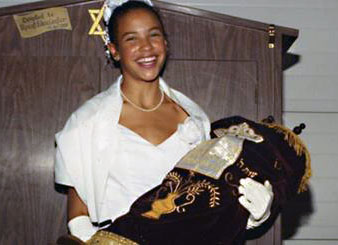 (from Vox) When Lacey Schwartz was accepted to Georgetown University, the school saw her photo and passed her name along to the black student association. The organization contacted her.
(from Vox) When Lacey Schwartz was accepted to Georgetown University, the school saw her photo and passed her name along to the black student association. The organization contacted her.
The only issue: Schwartz had grown up in a Jewish household in Woodstock New York, and had always — despite occasional questions about the source of her brown skin and curly hair — identified as white. She confronted her mother, who revealed that Schwartz’ biological father was actually a black man. The 18-year-old began a quest to reconcile her newly discovered identity with the way she was raised, all while navigating sensitivities around what had been a family secret.
/cdn0.vox-cdn.com/uploads/chorus_asset/file/2469018/H_H_Lacey_21-475x309.0.png)
Schwartz and her mother in a still from Little White Lie
Little White Lie, currently in limited theatrical release in New York, LA, and San Francisco, and set to air on PBS in 2015, is her documentary about that journey. Watch the trailer here:
In part, it highlights the subjective and malleable nature of racial identity. “If you looked too closely at it, it didn’t make any sense, so we found ways to see what we wanted to believe,” Schwartz says. “I wasn’t pretending I was something I wasn’t. I actually grew up believing I was white.” A childhood friend adds, ” I always looked at you like you looked black … but not that you were.”
Schwartz, who told Vox she now identifies as “black/biracial,” explaining, “I look at bi-racial as a category of being black,” said Little White Lie’s message is about more than just race. “I think the film’s broader lesson is about the power of telling the truth, having difficult conversations and then moving forward,” she said.
Further reading:
This insanely detailed map proves race is a social construct
After the ‘White Lie,‘ a rich narrative unfolds